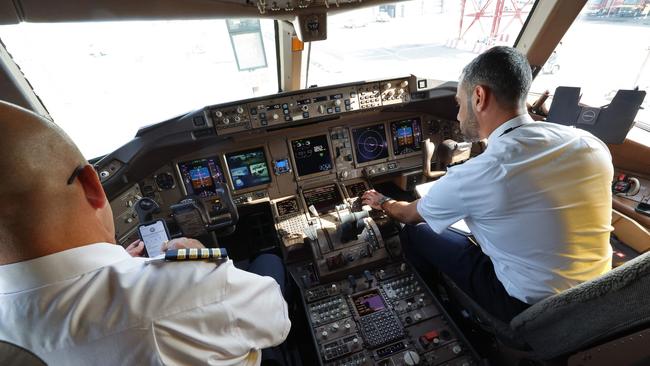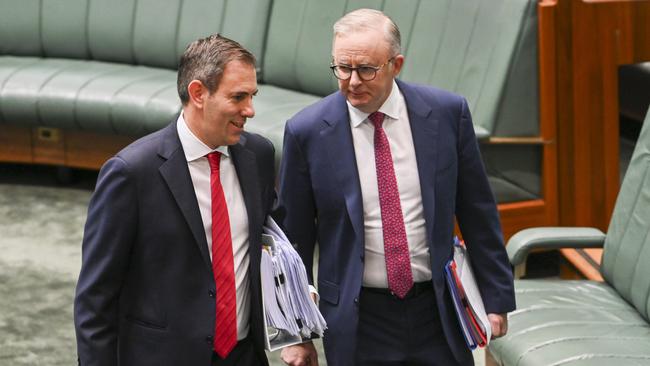
The move would be a boon to the rural sector and Australia’s steps towards a lower emission future, given 45 per cent of Australian energy comes in a liquid and sectors like aviation and steel are notoriously hard to abate.
Alternatives like batteries and hydrogen are there, but long term at best.
What is ultimately needed is a clear statement of commitment from the federal government to proceed and while like any sector the list of “nice to haves” is long, more than anything it’s clear mandates that are needed.
It would be another leg to Australia exploiting its renewable energy comparative advantage.
Jim Chalmers has urged business to invest more, and this is a chance to help achieve that aim.

Each year 58 million petajoules of solar energy fall on Australia, but in 2021 the country converted just 100 petajoules of solar to electricity.
This week BP’s biofuels boss Nigel Dunn was in town to talk up SAF opportunities and visit partners including Greg Hunt from Nufarm.
BP’s Australian boss Frederic Baudry spoke up the fuel opportunities at a Parliament House function earlier in March. The company sees big upside for SAF in Australia.
Nufarm has developed a new seed cover crop, carinata, which has the big advantage over the likes of canola because it is a non-food oil which means it doesn’t compete with people’s need to eat and also helps develop soil carbon with its long root structure.
The European Commission blocks food crops from being used in SAF.
BP is already using Nufarm’s Nuseed Carinata, grown in Argentina, for its European operations, and Dunn sees the chance to use more as Hunt rolls out his crop around the world.
Cargill boss Zsolt Kocza will soon take the next step towards building an oil seed crushing plant near the BP refinery at Kwinana.
Cargill was named on Thursday by the WA government as a provisional lease owner at the site, pending a final decision on starting the $600m-plus facility.
WA grain giant CBH is also a leaseholder near the old BP refinery.
Final investment decisions by the likes of BP and Cargill will take Australia to a potentially regional based industry providing low emission fuel to cut carbon emissions by as much as 80 per cent.
The decisions are interlinked and ultimately dependent on government commitments, which can start with existing policies on low emission fuels to mandates on the use of SAF.
The key policy tests from the federal government will come from the May budget and the aviation white paper, due mid-year.
Europe is committed to airlines using 6 per cent SAF on each flight and 20 per cent by 2035.
Singapore has mandated 1 per cent of each flight’s fuel must be SAF.
No one is pretending SAF is the only answer to Australia’s emissions reduction target, but as a partial solution to a hard to abate sector it’s a positive step.
Australia is superbly placed to fill the growing demand for SAF when you consider 77 per cent of Australian canola is already shipping to European crushing plants.
In a recent report, Rabo bank said “SAF demand is likely to be significantly higher than oil seeds can ever meet” with just 10 per cent of Australian canola and cottonseed enough to supply 21 per cent of Australian SAF demand by 2050 and even if the entire crop was used only 20 per cent of demand would be met.
In Townsville, Qantas is an investor in another biofuel production facility being developed by Jet Zero in partnership with US-based Lanza Jet’s alcohol-to-jet technology to produce up to 100 million litres of SAF per year.
In the trade, biofuel is called “drop in” fuel because it simply replaces existing fuels and the engine sees no difference.
Qantas is committed to using SAF for 10 per cent of its fuel needs by 2030.
It has noted decarbonising aviation is critical to Australia’s broader emissions reduction targets.
Further, as the global community shifts, its ability to fly to several key offshore markets will start to be restricted from 2030 without significant action.
The airline has already sourced SAF from California, and it notes the lack of an industry in Australia is a drawback.
The industry’s wish list includes: providing capital support to kickstart new production facilities; a production incentive linked to carbon reduction from fuel to allow domestic producers to compete with overseas markets; tax incentives and credits to SAF producers, similar to what occurs in other government programs; sustainable aviation fuel mandates for the domestic jet fuel supply, including 5 per cent by 2030 rising to 28 per cent by 2040.
Mandated SAF levels are key.
After the sometimes heated debate on vehicle fuel emission standards for cars, the SAF issue is comparatively easy because it has universal support.
Pensioners in the frame
Amid concerns about cost of living and housing shortages, pensioners are not impressed about government claims touting thresholds for pension payments.
Figures from Super ED show a person who doesn’t own a home, with the maximum of $543,750 in super assets, is deemed to earn $11,000 on those assets, which exceeds the threshold for the income test for the full pension of $5304.
The person holding the maximum in financial assets can’t in fact get the full pension but the stated thresholds way over-estimate the available payouts.
The stated cut-offs for homeowners to get any pension is assets above $674,000 for single people and $916,000 if you don’t own a home, and $1m for a couple with a home and $1.3m for non-home owners.
New merger rules coming
The federal government is due to release its response to the ACCC’s request for new merger rules in mid-April, including a reversal of the ownership of proof of competition breaches and mandatory notification below a low threshold of around $30m deal value.
Cancer specialists Icon Group, owned by EQT, is clearly wanting to play ball with a record four transactions listed on the same day in March, for consideration with decisions due on June 6.
They include three hospital leases, two in Queensland, and a joint venture with US-based Cyberknife Australia to build another six oncology units.
The latter uses linear accelerators to provide radiation oncology treatment.
The sudden realisation that competition issues may be involved arose from conversations with the regulator on a different deal.
In a statement, Icon said it proactively notified the ACCC of the currently listed transactions and has been working constructively with the ACCC on them.
The ACCC wants to be told of every deal, and is also leery about private equity roll-ups to build scale before sale.






The next few months will decide whether Australia can launch a new industry providing sustainable aviation fuel to the domestic and global aviation industry, and potentially creating over 25,000 new jobs and $10bn-plus a year in income.